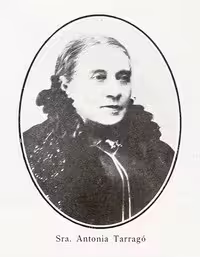1832 - 1916
Date Added:

An activist for the right to higher education for women in Chile, in the mid-19th century, Professor Antonia Tarragó González founded the Liceo Santa Teresa, the first educational center for women focused on equal education and equal conditions with their male peers. Her work was established with the signing of the Amunátegui Decree of 1877, which allowed women access to university. She began as a teacher in a kindergarten and in 1864 she founded the Liceo Santa Teresa in Santiago, a non-denominational female establishment that she directed together with her sister Ignacia. Following the curricular plan of the National Institute, it included classes in arithmetic, geography, history, French, among other subjects; from the beginning they had to confront the Catholic Church that was opposed to women studying to be something more than housewives and/or mothers. Antonia taught Spanish and history. She encouraged her students not to give up on their academic training. “My students, do not faint; it does not matter that some timid spirits still want to chain the flight that you have undertaken,” she would say in a speech. In her role as principal, in 1872 she requested the Council of Public Instruction that the exams taken by her students be valid for university degrees. Although the request was rejected twice, it sparked debate on the issue and inspired the feminist aristocrat Isabel Le Braun de Pinochet to create another high school with a curriculum equal to the male one and to submit a new request to the Council in 1876, which was finally approved. In 1911, when Antonia Tarragó González was 79 years old, the high school had to close due to lack of subsidy from the State. Without work and helped financially by a group of former students, she died six years later.
Share your thoughts on this story with us. Your comments will not be made public.
Email
Copyright ©2016 - Design By Bureau Blank